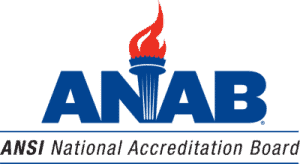How Does Accreditation Save Your Organization Money?

Accreditation (i.e., the process of evaluating an institution or program to assure it meets certain standards) goes hand in hand with lower costs. This process saves your organization money by helping implement a strong risk management program and thus operational efficiency. Moreover, accreditation signals that your organization is fiscally responsible.
Accreditation Can Save Money for All Industry Types
There are a variety of accreditation types: laboratory, quality management, sustainability, manufacturing, information technology, healthcare, aerospace, automotive, engineering, construction, agriculture, etc. The point being that whatever industry, you are in, accreditation can save your organization money.
- Accreditation can help streamline business practices and make a company run more effectively, such as via the implementation of a robust risk management program.
- Accreditation can promote an engaged atmosphere where communication, learning, and operational efficiency are key.
- Accreditation may improve access to and reduce the cost of liability insurance coverage.
How Does Accreditation Enhance Risk Management?
One critical way for an organization to operate efficiently is via risk management: the process of identifying, assessing, and controlling financial, legal, strategic, and security risks to an organization’s capital and earnings. These threats, or risks, could stem from a wide variety of sources, including financial uncertainty, legal liabilities, strategic management errors, accidents, and natural disasters. Risk management helps catch unforeseen events that could drastically impact overhead costs and in the worst scenario cause closure of a business.
A consistent, systemic, and integrated approach to risk management—one that accreditation offers—helps determine how best to identify, manage, and mitigate significant risks. Accredited programs are considered lower risk because they conform to accreditation standards related to risk management, human resources, health and safety, corporate compliance, and business practices. By enhancing risk management efforts, accreditation may improve access to and reduce the cost of liability insurance coverage.

Accredited Organizations Operate More Efficiently
By helping to streamline business practices accreditation success can come in the form of a more effective way of running your company. Financial institutions (e.g., investment bankers, insurance carriers, rating agencies) recognize that accredited organizations have more efficient operations, provide better services, and are more fiscally responsible. Accreditation is viewed as a sign of financial stability. Accreditation may also have a positive effect on liability insurance premiums and may improve consideration for managed care contracts.
Accreditation Can Decrease Risks and Liability Costs
Safer care means fewer risks and adverse events. Patient safety interventions, such as the ones required to achieve accreditation, can save more money in avoided adverse events than they cost. For example, in 2017, Williams et al. looked at 711 accredited long-term care homes in the United States. They studied a wide range of ratings including health inspections, staffing, inspection deficiencies, fines, and quality measures. The study found that the 711 accredited facilities had a better performance on these measures, indicating that the accredited facilities exposed residents to fewer immediate risks. Other financial benefits of accreditation are improved operational efficiency and reduced liability cases and consequently less liability costs.
How Does Accreditation Save You Money?
Accreditation is a means to reduce costs and redundancy. Through risk management, accreditation enhances an organization’s operational efficiency. In other words, accreditation helps quickly identifies gaps and areas of opportunity in practices and procedures; it highlights areas of improvement (people, operational, safety, etc.). By shedding light on the strengths and weaknesses of your organization, accreditation helps you know where to focus your efforts and in so doing helps your organizations be financially responsible. Examining your weaknesses and thus gaps helps reduce legal and liability costs.
ANAB Accreditation
ANAB Accreditation assures consumers as well as industry and government decision-makers that accredited organizations are competent and that their results are reliable, impartial, and consistent—which are key components of conformity assessment. It tells stakeholders, insurers, customers, and the general public that your organization values safety and that you have made a commitment to best practices and regulatory requirements.
Achieving accreditation also can help save your organization money as it optimizes your management and maximizes the efficiency of your operations.






